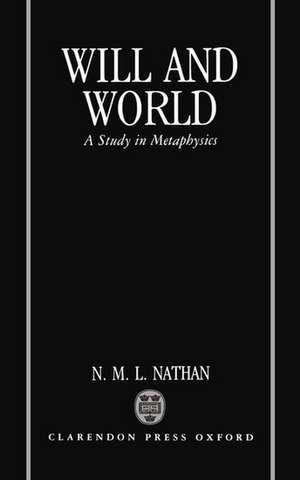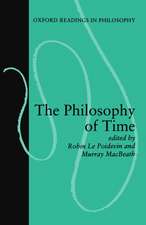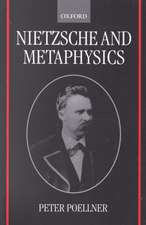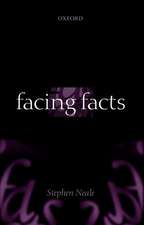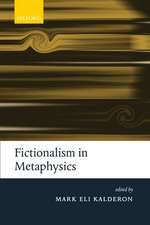Will and World: A Study in Metaphysics
Autor N. M. L. Nathanen Limba Engleză Hardback – 16 ian 1992
Preț: 712.49 lei
Preț vechi: 1083.01 lei
-34% Nou
Puncte Express: 1069
Preț estimativ în valută:
136.33€ • 148.56$ • 114.88£
136.33€ • 148.56$ • 114.88£
Carte tipărită la comandă
Livrare economică 12-18 aprilie
Preluare comenzi: 021 569.72.76
Specificații
ISBN-13: 9780198239543
ISBN-10: 0198239548
Pagini: 182
Dimensiuni: 144 x 224 x 19 mm
Greutate: 0.36 kg
Ediția:New.
Editura: Clarendon Press
Colecția Clarendon Press
Locul publicării:Oxford, United Kingdom
ISBN-10: 0198239548
Pagini: 182
Dimensiuni: 144 x 224 x 19 mm
Greutate: 0.36 kg
Ediția:New.
Editura: Clarendon Press
Colecția Clarendon Press
Locul publicării:Oxford, United Kingdom
Cuprins
Introduction; Want and belief conflicts; Free will; Coherence and internal propositions; Freedom and natural order; Palliatives; Free will and free action; Volition; Evidence; A programme subsumed
Recenzii
Nathan has written an intriguing, and very readable book.
this ambitious and densely argued book.
I think Nathan has given us an interesting and provocative view of the metaphysical enterprise that rings true in many ways and deserves to be widely discussed by philosophers.
this is a book well-worth reading, especially for its account of metaphysical enquiry in terms of want-belief conflicts and self-critical world views, which is I think, an original and significant contribution to current debates about metaphysics, and about the nature of philosophy generally.
Nathan's bold and imaginative book is full of interesting philosophy rigorously worked out. Those concerned about the freedom and reality of the will or about philosophical methodology can surely profit from studying it.
On the question of free will, what's most novel and also most valuable in Nathan's account is not his final conculsions, which tend to be unsurprising, but the details along the way, particuarly his many refind distinctions and the relatively comprehensive explanations he provides of how these bear on central issues in the literature.
`This meticulous, erudite ... examination of metaphysics and free will from an interesting direction makes an impressive book.'Ethics, 4/93
`This is a suggestive work, well worth reading'Times Higher Education Supplement
`a book well-worth reading, especially for its account of metaphysical enquiry, which is an original and significant contribution to current debates about metaphysics, and about the nature of philosophy generally.'Philosophica
'Nathan's account is distinctive in that it is unusually clear ... Nathan's bold imaginative book is full of interesting philosophy rigorously worked out. Those concerned about the freedom and reality of the will or about philosophical methodology can surely profit from studying it.'Raymond Martin, Mind, Vol. 102, No. 408, Oct '93
'The most impressive part of the book ... is Nathan's discussion of volition, which is provocative and metaphysically adventurous ... There is a superb discussion of secondary qualities, Nathan defending what he calls noumenalism about colours.'Sebastian Gardner, Birkbeck College, University of London, The Philosophical Quarterly, 1994
'Nathan's bold and imaginative book is full of interesting philosophy rigorously worked out. Those concerned about the freedom and reality of the will or about philosophical methodology can surely profit from studying it.'Raymond Martin, University of Maryland, The Philosophical Quarterly, 1994
this ambitious and densely argued book.
I think Nathan has given us an interesting and provocative view of the metaphysical enterprise that rings true in many ways and deserves to be widely discussed by philosophers.
this is a book well-worth reading, especially for its account of metaphysical enquiry in terms of want-belief conflicts and self-critical world views, which is I think, an original and significant contribution to current debates about metaphysics, and about the nature of philosophy generally.
Nathan's bold and imaginative book is full of interesting philosophy rigorously worked out. Those concerned about the freedom and reality of the will or about philosophical methodology can surely profit from studying it.
On the question of free will, what's most novel and also most valuable in Nathan's account is not his final conculsions, which tend to be unsurprising, but the details along the way, particuarly his many refind distinctions and the relatively comprehensive explanations he provides of how these bear on central issues in the literature.
`This meticulous, erudite ... examination of metaphysics and free will from an interesting direction makes an impressive book.'Ethics, 4/93
`This is a suggestive work, well worth reading'Times Higher Education Supplement
`a book well-worth reading, especially for its account of metaphysical enquiry, which is an original and significant contribution to current debates about metaphysics, and about the nature of philosophy generally.'Philosophica
'Nathan's account is distinctive in that it is unusually clear ... Nathan's bold imaginative book is full of interesting philosophy rigorously worked out. Those concerned about the freedom and reality of the will or about philosophical methodology can surely profit from studying it.'Raymond Martin, Mind, Vol. 102, No. 408, Oct '93
'The most impressive part of the book ... is Nathan's discussion of volition, which is provocative and metaphysically adventurous ... There is a superb discussion of secondary qualities, Nathan defending what he calls noumenalism about colours.'Sebastian Gardner, Birkbeck College, University of London, The Philosophical Quarterly, 1994
'Nathan's bold and imaginative book is full of interesting philosophy rigorously worked out. Those concerned about the freedom and reality of the will or about philosophical methodology can surely profit from studying it.'Raymond Martin, University of Maryland, The Philosophical Quarterly, 1994
